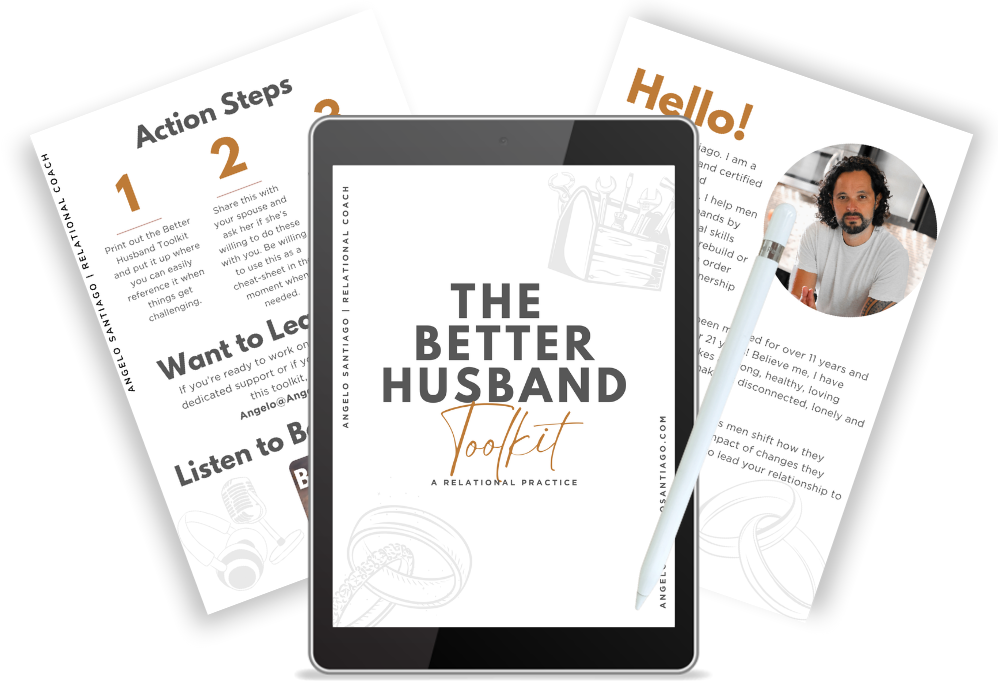How to End Arguments in Marriage by Yielding Instead of Defending
Sep 23, 2025
Defensiveness is one of the fastest ways to shut down a real conversation.
And in a marriage, that can make or break things.
When a partner shares that they feel disconnected, overlooked, or unheard, the instinct to defend yourself is natural, yes. But it’s also incredibly counterproductive. Defensiveness rarely resolves conflict; it often widens the gap, leaving both people feeling frustrated and misunderstood.
Arguments that start with defenses rarely end with solutions. Instead, they breed grievances, withdrawal, and future avoidance. Over months and years, a pattern of defensiveness can erode trust and intimacy. You might wake up one day and wonder when your partnership turned into battle after battle. Recognizing this pattern is the first step toward changing it.
If the question is how to diffuse an argument with your wife and rebuild trust, defensiveness is almost never the answer.
Yielding is. Yielding means setting aside the immediate urge to explain or justify and choosing, instead, to prioritize your spouse’s emotional experience. That small shift, however insignificant it may seem at first, can transform angry debates into a chance to connect more deeply.
Improving marriage communication begins with a few simple habits: pause before responding, listen to understand, and respond in a way that repairs rather than divides. Below are practical strategies that can be applied today to stop defending and start yielding.
Why Defensiveness Creates Distance

One of the most common and corrosive sources of conflict is tension around time and presence. It looks something like this: your wife says, “You’re always working, and I feel like we never spend time together anymore.” You hear a critique of your efforts, not the sadness beneath it. You reply with a defense about work and provision, and the conversation derails.
That mismatch of one partner asking for connection and the other hearing accusation creates resentment. You feel underappreciated; your wife feels alone. When these moments repeat, they erode emotional connection in marriage, and small grievances compound into significant distance.
Unresolved patterns around time and presence don’t just cause arguments; they shape daily life. Shared rituals fall away, check-ins become rare, and opportunities for intimacy vanish. Addressing the issue requires shifting from performance-based thinking (“I provide, therefore I’m right”) to emotionally responsive thinking (“She’s hurting right now; how can I help?”). This reframe is the core of effective marriage conflict resolution and a major step toward healthier marriage communication.
What Batman Can Teach Us About Relationships
Pop culture sometimes holds a mirror to real life. In Christopher Nolan’s The Dark Knight Rises, Bruce Wayne’s interactions with Alfred provide an example: Alfred expresses concern for Bruce’s wellbeing, but Bruce responds with defensiveness, arguing that his real concern is that Bruce will fail. The exchange becomes about Bruce’s pain and pride rather than Alfred’s care, and Alfred walks away feeling unnoticed and dismissed.
This scene captures a common dynamic: defensiveness turns a loving intervention into a personal attack. In marriage, when a partner expresses vulnerability and the reaction is to counterattack or justify, the vulnerable partner retreats. What was, at first, an attempt to connect becomes evidence that their emotions are unwelcome.
Do you see the parallel between film and life? This example teaches us that responding to the emotional ask rather than taking it as an attack is key to a healthy dialogue. Doing so signals safety, and safety is the foundation for repair and deeper intimacy.
The Opportunity: Yielding Instead of Defending
Yielding is an intentional practice: not sacrificing your own feelings and needs, but temporarily prioritizing your partner’s experience so that repair can happen. This action is rooted in generosity, and it’s based on a simple idea: a complaint is often a masked request. Learning to hear the request beneath the criticism is a high-leverage communication skill.
When you get the impulse to defend, try translating the moment into questions: “What is she feeling right now?” and “What would help her feel seen?” Answering those questions before speaking reframes the interaction. Yielding doesn’t mean erasing your perspective. Instead, think of it as creating the emotional safety necessary for your perspective to be heard later.
A useful mental model is to think in sequence: repair first, then reason. If feelings have been stirred, take a moment to repair the emotional damage before making an argument. This approach is both tactful and compassionate: it shows leadership through care, not through being right.
Practical Steps to Yielding

Here are four practical steps designed to be used in the moment. They’re simple, repeatable actions that change the way conversations unfold.
Step 1: Listen Without Defending
Active, nondefensive listening is the foundation. When your spouse speaks, resist the urge to interrupt. Use neutral, reflective language: “It sounds like you felt lonely this week when I was late.” This confirms your attention and calms the emotional heat.
Step 2: Ask Empathic Questions
After reflecting, invite further expression: “Is there anything I can do or say right now to make you feel better?” This question communicates availability and focuses on actionable repair. It also helps bring the conversation into the present, and encourages both of you to look to the future.
Step 3: Be of Service
Being of service to your partner's emotional state might be practical (helping with logistics) or relational (staying present). Small acts matter: putting down a phone, offering to handle bedtime, or asking, “Do you want me to sit with you?” Prioritizing that moment builds trust and goodwill.
Step 4: Trust the Process
Yielding feels vulnerable. It can be tempting to think, “If I don’t defend, I’ll come out blamed and misunderstood.” But trust that when a spouse is heard, they’re far more likely to hear you later. Sequence matters: yield now, engage in problem-solving later. This pattern deepens trust and models emotional responsibility.
Examples of Empathic Listening Phrases
When emotions are high, scripted language can help. Try these lines:
- “I hear you. Tell me more.”
- “Thanks for sharing that — I can see why you feel that way.”
- “Is there anything I can do right now to help?”
- “I want to understand. Can you tell me what you need?”
These phrases are short, non-defensive, and invite connection.
Exercises to Strengthen Your Marriage
Practice turns intention into habit. The following drills can be done weekly or daily to build the muscle of yielding.
Empathy Practice
The next time your wife comes to you with something that upset her, ask if there is anything you can do in that moment to help her feel better. The situation doesn’t even have to do with you. It could be an issue with a family member, friend, or maybe even a difficult situation that arose with the kids. Practice listening and reflecting back what you hear them say. Don’t wait for conflict between you two to start practicing.
Reflective Listening Practice
Take your next conversation as an opportunity to practice reflective listening. It can be any ordinary conversation, too. Reflect back whatever feelings or emotions your wife communicates to you. For example, maybe she and her friend had a misunderstanding, and your wife shares that she is upset. In your own words, repeat her feelings back to her. This can make her feel heard and validated.
Yield-First Drill
When irritation arises during conflict, pause and take a deep breath before responding. Remember that it’s more important to yield and then lead with curiosity in the first moments of conflict. Your time to explain your side will come.
Yielding Can Lead to Building Trust and Connection
Defensiveness is a common, understandable reaction. But in marriage, it undermines intimacy. Choosing to yield is not a sign of weakness; it is an act of leadership in love. By pausing, listening, and prioritizing your partner’s emotional needs, you move from argument to repair, and from distance to connection.
–
If you’re ready to take the next step toward a stronger, more connected marriage, don’t stop here. Listen to the full Better Husband podcast episode on navigating arguments and building trust in your relationship.
You can also register for my workshop, where you’ll learn practical tools and exercises to improve communication and deepen your connection.
Need Help In Your Marriage?
Subscribe to the Better Husband Newsletter to get weekly updates with marriage support, new blog posts, podcast updates and more!
By signing up you consent to receive regular emails from Angelo Santiago with updates and the occasional promotion for services. You can unsubscribe at any time. View our detailed privacy policy in the footer.





